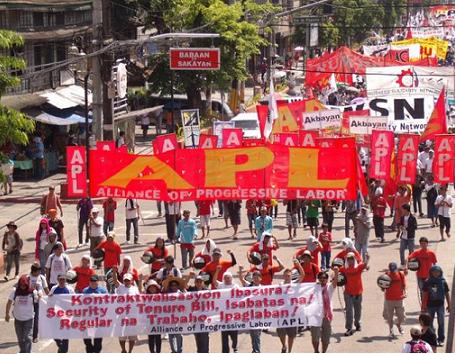 |
| Labor Day recognizes the efforts of workers worldwide.
©iStockphoto.com/Marisa Allegra Williams |
The eight-hour
day movement advocated eight hours for work, eight hours for
recreation, and eight hours for rest. This was in reaction to the previous
labor practice wherein workers were being forced to work 12-14
hours a day, six days a week. From Wikipedia, we learned that in 1884,
the Federation of Organized Trades and Labor Unions passed a resolution stating
that eight hours would constitute a legal day's work from and after May 1,
1886. The resolution, which gained broad support from workers,
called for a general strike to achieve the goal due to failure in
legislative methods.
But on the scheduled date for mobilization, what started as a peaceful rally ended into a tragedy when in the evening while the police were trying to disperse the crowd, someone threw a bomb killing several policeman immediately. The police retaliated by firing shoots. Thereafter, a rampage occurred resulting to death and injury of both police and demonstrators workers.
 |
| Photo credit:http://www.interaksyon.com |
According to the Historical Calendar (1521-1969) of the National Historical Institute, the first
official celebration of Labor Day was held on May 1, 1913, when 36
labor unions convened a labor congress at Cine Oriente on CM Recto Street, then
known as Azcarraga, in Manila. This gave birth to Congreso Obrero de Filipinas.
It was also in 1913,when a law establishing Labor Day was passed.
 |
| Photo credit: wikipilipinas.multiply.com |
However, according to Philippine Government Information site, as
early as 1903, when the country was still under the US colonial
government, Filipino workers were already fighting for their rights,
specifically, the increase of wages. Reportedly, over 100,000
workers organized by the Union Obrera Democratica de
Filipinas (Democratic Labor Union of the Philippines) trooped to
Malacañang on May 1, 1903 for anti-imperialist rally while
pressing for workers’ economic rights. Prior to this, the Union's leaders
met with William Howard Taft to demand that May 1 be declared as Labor Day. But
it was not granted. Neither was their request to organize a rally. Still
they pursued it. Consequently, the Union president Dominador Gomez was
arrested for charges of illegal association and sedition.
 |
| Courtesy of http://www.indybay.org |
The historical notes related to the celebration of Labor Day
remind us of sacrifices of those who labored hard for the welfare of the
workers. Many had not witnessed the fruit of their labor. Some were
persecuted while others were punished and condemned. But history
vindicates them. This is an inspiration to all those who are engaged in
any advocacy towards change and development. No matter how rough and tough
times and circumstances are, these are not reasons to give up. For as implied
in the Pauline
epistle, we are assured, our labor will never be in vain, after all.
As we honor the workers and the entire labor sector today for their role in the national and global economic activities, we also recognize the role of labor movement in our development. Many of the benefits and rights that we enjoy today in our respective employment are result of their struggle.
As we honor the workers and the entire labor sector today for their role in the national and global economic activities, we also recognize the role of labor movement in our development. Many of the benefits and rights that we enjoy today in our respective employment are result of their struggle.
No comments:
Post a Comment